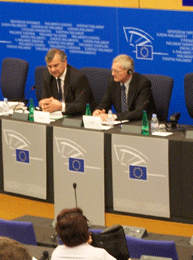January 29, 2007NCRI - A conference was held on January 23 at Geneva Press Club to defend the political refugee rights of members of the People's Mojahedin Organization of Iran (PMOI) in Ashraf City, Iraq. Members of the Swiss Federal and Geneva parliaments as well as human rights and political personalities, attended this conference and spoke about the situation at Ashraf.
They were concerned by the well being of the people of Ashraf, especially since the Iranian regime, which is widely detested at home, has been trying since 2003 to rid itself of its opposition by taking advantage of the situation in Iraq. It has been working feverishly to have the PMOI members repatriated to Iran from Iraq or at least have them expelled from that country. According to the Fourth Geneva Convention and international law, such an outcome would be considered a war crime or crime against humanity.
The Iranian regime’s plots to realize this objective have been stepped up dramatically in recent months, as the mullahs have employed all their political, intelligence and terrorist means at their disposal in Iraq.
In a joint statement issued after a meeting between the Iraqi and the mullahs’ presidents in Tehran, the Iranian regime welcomed the “recent decision by the Iraqi government to expel members of the terrorist Monafeqin [Mojahedin] grouplet from Iraq and described the quick implementation of this decision as positive step in expanding and strengthening relations between the two countries.”
On July 19, 2006, Iraqi Prime Minister Nouri Al-Maliki told Agence France Presse that “he was looking for the ways to end the presence in Iraq of the Iranian opposition group, the People’s Mojahedin of Iran (MPOI).”
On January 15, 2007, the Iranian regime’s Minister of Intelligence and Security, Gholam Hossein Mohseni Ejei, met his Iraqi counterpart, Shiran al-Waili, and discussed among other things,” activities of the terrorist Mojahedin Khalq Organization (MKO/PMOI) based in Iraq,” the state-run news agency, Mehr, reported.
On July 28, 2006, Abdul Aziz Al-Hakim, the head of the Supreme Council for Islamic Revolution in Iraq, said in a speech, aired by Al-Araqieh Iraqi television station, “terrorist organizations in Iraq, including the terrorist Mojahedin-e Khalq, must be expelled from Iraq.”
On August 3, 2005, Iraq’s National Security Advisor, Mowafaq Al-Rubaiee was quoted in the state-run daily Jomhuri-Eslami as saying, “The organization’s [PMOI] criminal members must be prosecuted in Iraq and other members of this grouplet who have not committed a crime must be either extradited to Iran or be expelled from Iraq.”
These comments were made despite the fact that the government of Iraq must remain committed to the obligation of previous Iraqi government. The refugee status of PMOI members in Iraq was reaffirmed even after the fall of the former Iraqi government by Mr. Iyad Allawi and Dr. Ibrahim Jafari.
In an interview with the Iraqi weekly, As-Shahed Al-Mustaqel on September 20, 2005, former Iraqi Prime Minister Dr. Iyad Allawi said he considers the PMOI members “political refugees covered under the Geneva Convention and international laws.”
According to the Iraqi daily As-Safir on August 9, 2006, Iraqi Deputy Prime Minister for Security and Services, Dr. Salaam az-Zubai, “reaffirmed PMOI members’ rights to a legal presence in Iraq as political refugees and said that they enjoyed the special status of protected persons under the Fourth Geneva Convention.”
In addition, in a declaration in June 2006, some 5.2 million Iraqis underscored that the PMOI enjoyed legal presence in Iraq for 20 years and had acted the main bulwark against the spread of fundamentalism. They also stressed that the status of its members as political refugees in Iraq must be reaffirmed.
The speakers at the conference stressed that the United Nations High Commissioner for Refugees is responsible for the safety and well being of Ashraf residents and that it must end its silence and inaction vis-à-vis the residents of Ashraf. Because the more the UNHCR remains silent, it will only send the signal to the Iranian regime that it can continue to conspire against PMOI members in Ashraf.
That is why we have been urging the UHCR to reaffirm the 20-year legal presence of the Mojahedin in Ashraf, and urge the Iraqi government to abide to the principle of non-refoulement, as well as the prohibition on any form of involuntary displacement of Ashraf residents and that those in Ashraf are entitled to enjoy political refugee status.
